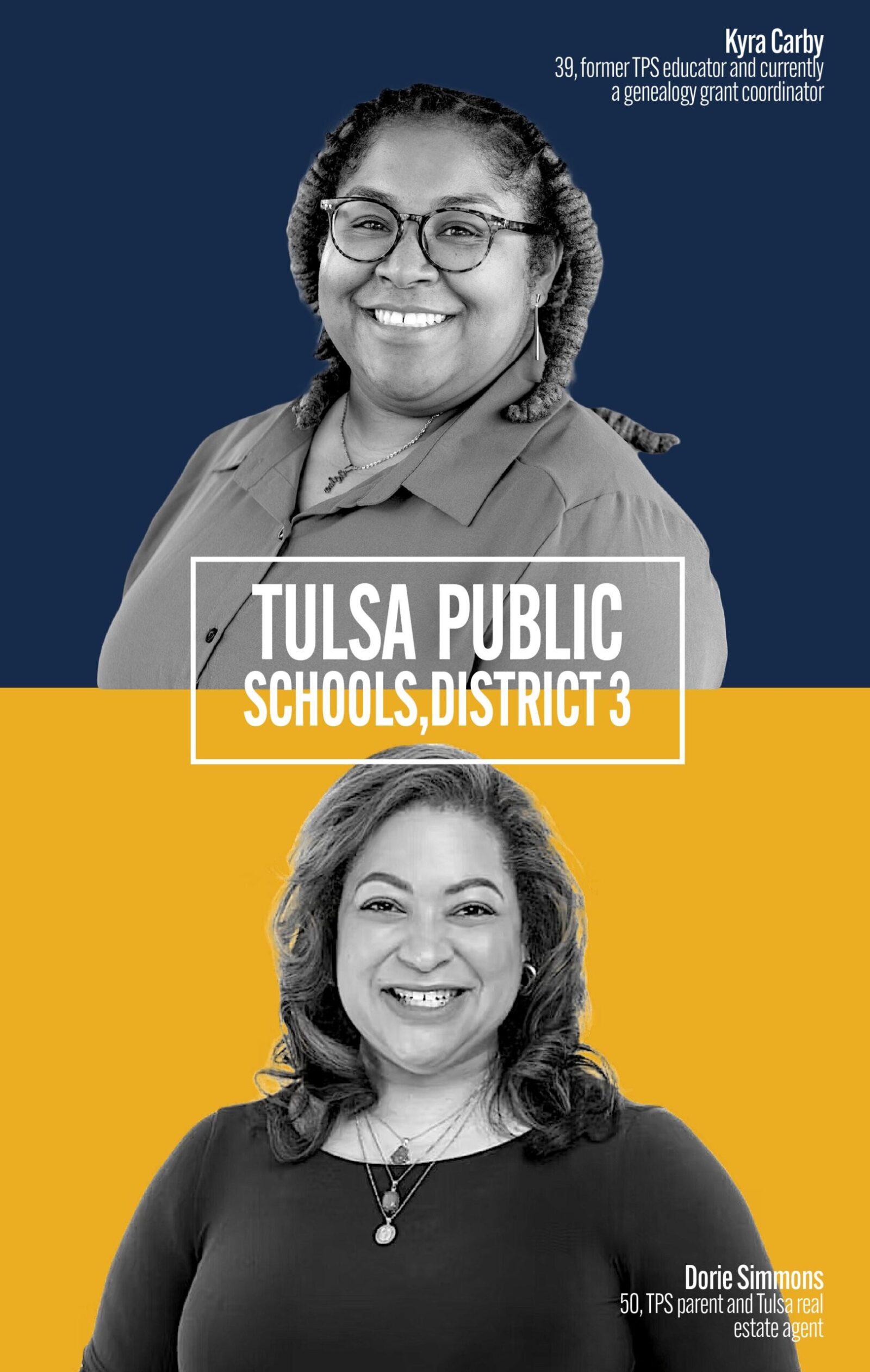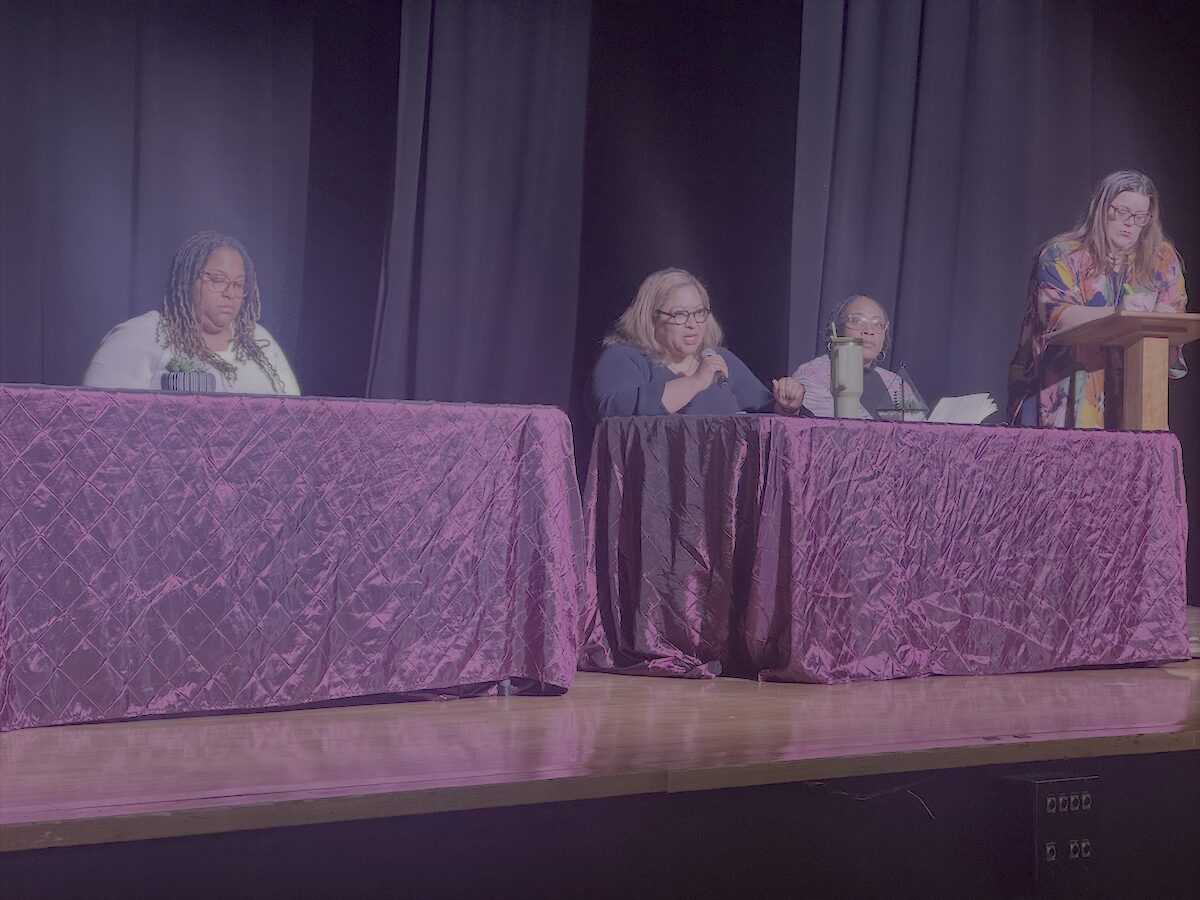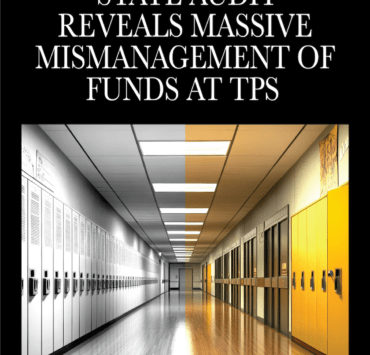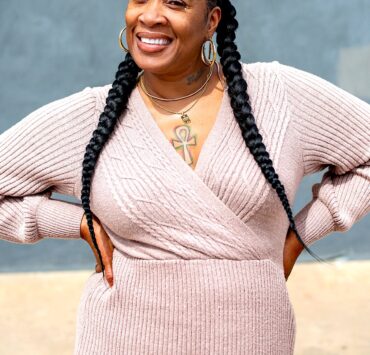
LOCAL & STATE
Kimberly Marsh
Photos, Basil Childers, The Oklahoma Eagle
Kyra Carby and Dorie Simmons, Tulsa Public School board candidates vying for a seat to represent North Tulsa’s District 3, have rounded off their stances on issues for the general election set for April 1. Their platforms reflect agreement on several fronts, but differ vastly in their approach to the role. Both candidates care deeply about student outcomes and teacher retention. Carby is willing to challenge systems head-on. Simmons is focused on preserving harmony and ensuring consensus-driven change.
During a Tulsa Classroom Teachers Association candidate forum on Feb. 4 at McLain High School, a District 3 grandparent wanted to ask questions of the candidates. She was told the forum was for moderator questions only. The Oklahoma Eagle followed up with the resident, Joyce Smith Williams, to ask what questions she had for the two candidates as they head into the general election. Williams is African American and a fervent advocate for Black Tulsa. This analysis reflects candidate statements made during the February forum and in response to more recent written questions. The story on the forum can be found in the Feb. 28 issue of The Oklahoma Eagle.
The candidates
Carby, 39, is a former TPS educator and currently a genealogy grant coordinator with the City of Tulsa. She is reform-minded and willing to challenge the systemic inefficiencies and oppose policies she believes are harmful to students, teachers and advocates. Carby sees the board’s role as one that must actively challenge the status quo. She advocates for bridge building between the district, schools, and communities. Her focus is on accountability through data and rebuilding trust through community engagement.
A TPS parent and Tulsa real estate agent, Simmons, 50, positions herself as a stabilizing force seeking unity and collaboration over confrontation. She prioritizes maintaining a professional public image for the board, advocating for internal disagreements to be handled outside of meetings, and oversight through respectful dialogue and unity. Her vision of accountability is rooted in clear policies and community trust. She emphasizes supporting teachers and mitigating stress.

A District 3 resident’s perspective
In an interview with The Oklahoma Eagle, Williams provided her perspective on five areas of priority. They are: accountability and financial oversight; public engagement and transparency; the role of the TPS school board and its member; re-establishing the purpose of education; and protecting the system from politics.
Williams believes that more budget scrutiny and responsible stewardship of taxpayer dollars is necessary. She is frustrated by the board’s lack of interaction with citizens during board meetings, saying it demonstrates an unwillingness to engage with the public and respond to concerns. Board member roles are ambiguous, she said, and sometimes influenced by politics rather than educational outcomes. Board members should focus on student achievement and instructional quality—not on governance or politics, she said. Education generally, in her view, should help students—especially Black and brown children—understand their place in the world, think critically, see themselves in the curriculum and be more exposed to experiential learning.
A School Board Member’s Primary Role
Question: In your view, what is the primary role of a school board member, and how do you see yourself fulfilling that role if elected?
Carby: The primary role of a board member is the fiduciary responsibility of how the district spends resources, voting on budgets, voting on policies, supporting the district, but also…asking questions about things that come up for board approval. I will be prepared for all meetings, asking questions, holding community meetings to better ensure that our communities understand what is coming before the board and how it impacts them. Hard decisions and conversations have to be made, but also not wasting time grandstanding during board meeting
Simmons: The primary role of a school board member is to represent the interests of students, families, and the community while supporting and holding the superintendent accountable for delivering results. That means setting clear goals, ensuring transparency, and making sure every decision we make puts students first. I’ll focus on collaborating not just with other board members, but with teachers, parents, and the community.
Board Division
Question: Can you give an example of a difficult situation where the board is divided—how would you handle that disagreement, and what principles would guide your decision?
Carby: Currently the board is divided on what the role is of the board. I think it is imperative that, as a board, we look at fundamentally what our responsibilities are and what that process looks like as it relates to how we operate within the district. For that to happen, there needs to be relationship building so there’s respect amongst board members so that we can move in a way that better serves our students.
Simmons: When the board is divided, it’s crucial to stay focused on what matters most, improving student outcomes. I approach tough decisions by listening carefully to all sides, reviewing the facts, and considering the impact our decisions will have. I believe in respectful dialogue.
Board Transparency and Interaction
Question: Do you believe the board should change how it interacts with the public? If so, what steps would you take to improve transparency and community dialogue?
Carby: Realistically, I think that you cannot always answer public comments or questions in real time at board meetings. There should be better follow up about questions, but there also should be a better understanding of what’s coming before the board so that the public has a chance to ask prior to that.
Carby added that communities should be constantly updated to make sure they understand board agendas prior to the meetings.
Simmons: While there are legal limitations on how board members can respond during public comments, that doesn’t mean we can’t do better and be more accessible.
Simmons said she advocates for more opportunities aside from the board meetings to connect directly with the community via other forums.
TPS Accountability
Question: What does accountability mean to you as a board member?
Carby: Accountability is us looking at the data of where our schools actually are. It’s about looking at each site to see where our gaps are within our education system.
Carby said when resources are not placed where they are needed the most to move student success, the system fails its students.
Simmons: As a board member, I would hold myself accountable by listening to concerns, communicating openly, and making decisions based on what’s best for our students, teachers, and parents. I would expect the same from the superintendent and district leadership.
Simmons added that this includes clear goal-setting, monitoring progress, and asking tough but fair questions.
Teacher Support
Question: What specific policies would you push for to improve teacher retention, and how would you ensure those policies are actually implemented? What type of teacher support would you advocate? What do you think about the level of autonomy teachers should have in the classroom?
Carby: As a former educator, I know how imperative it is for teachers to have time to actually work on their lessons and in their classrooms, it would be important to ensure that they aren’t constantly losing valuable plan time due to meetings.
Carby suggested mentors for novice teachers, site-specific professional development and treating teachers as the professionals they are. Higher retention rates lead to a better experience and an understanding of students that is only gained in the classroom.
Simmons: To retain great teachers, we need to offer competitive pay, manageable class sizes, and up to date resources for classrooms. As highly trained professionals, they know what is best for their students. I will fight alongside them to defend their right to teach in the classroom with no political interference or agendas that have no place in our schools.
The author of this article, Kimberly Marsh, is veteran contributor to The Oklahoma Eagle.









